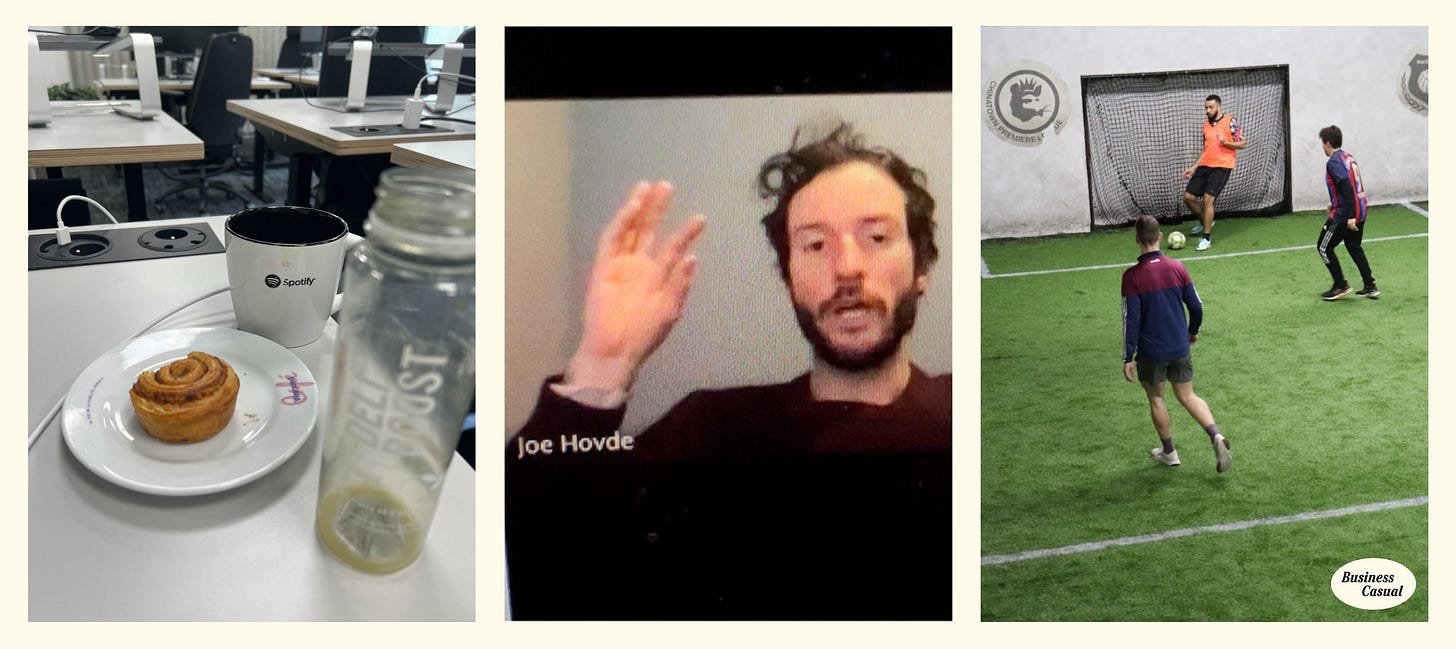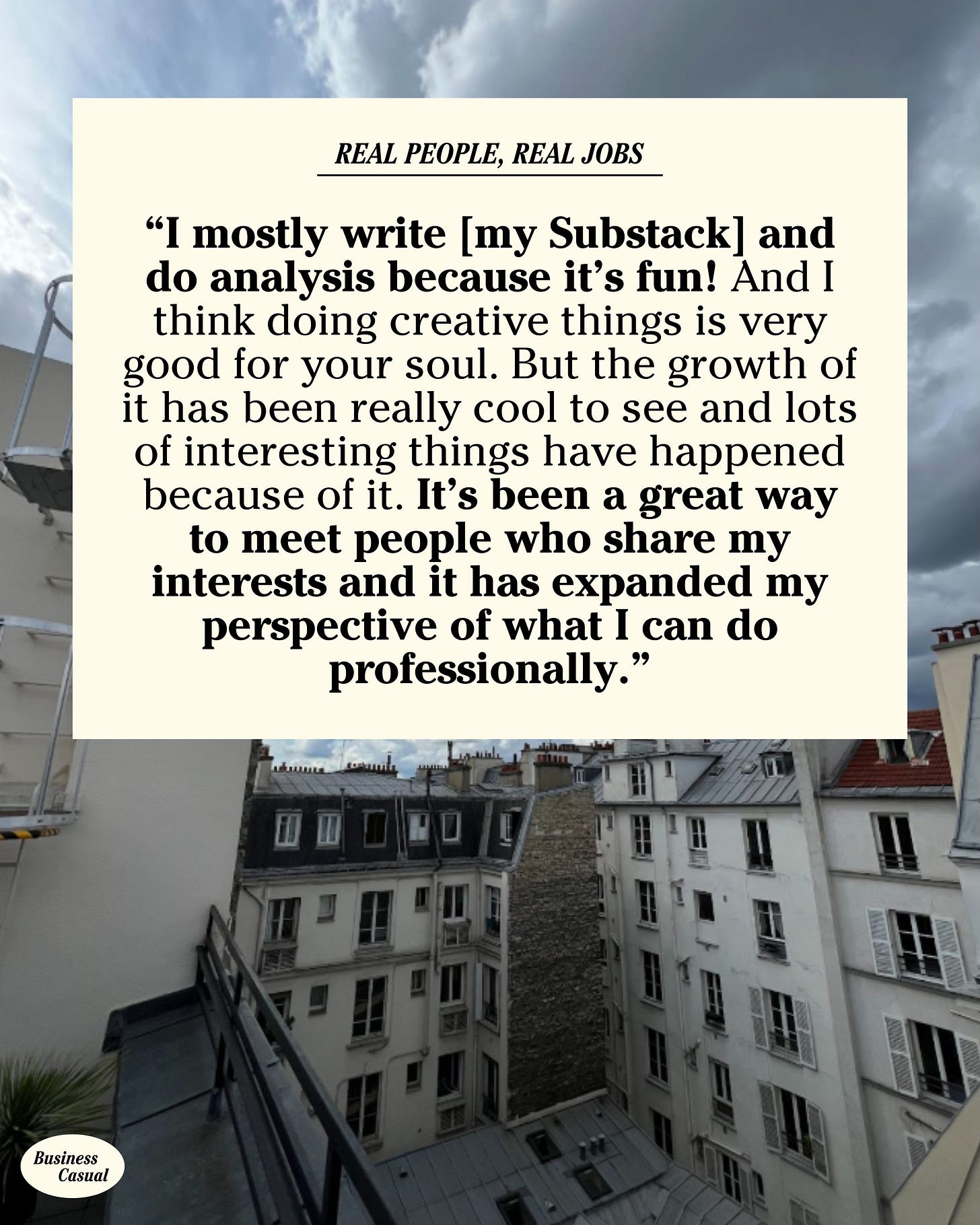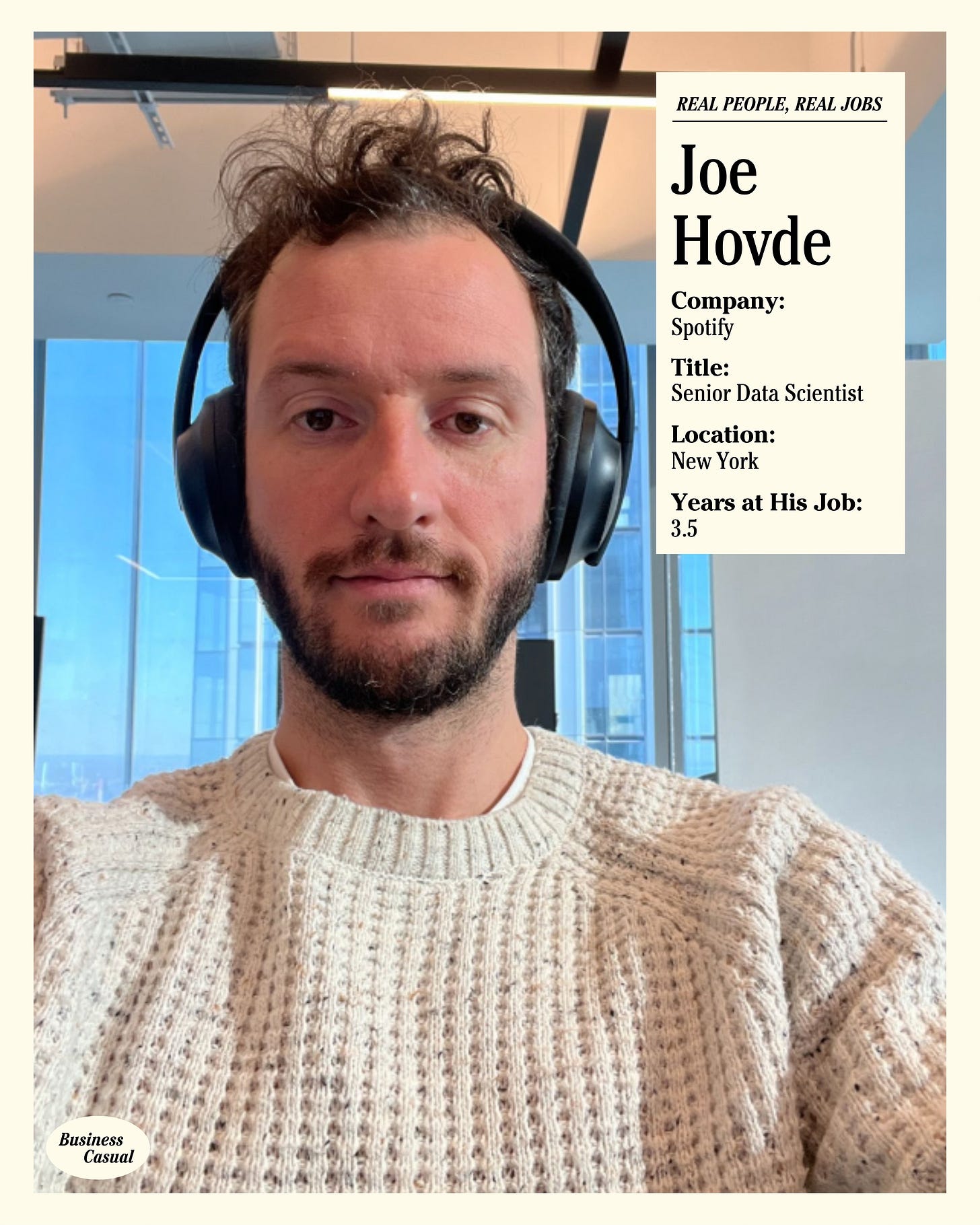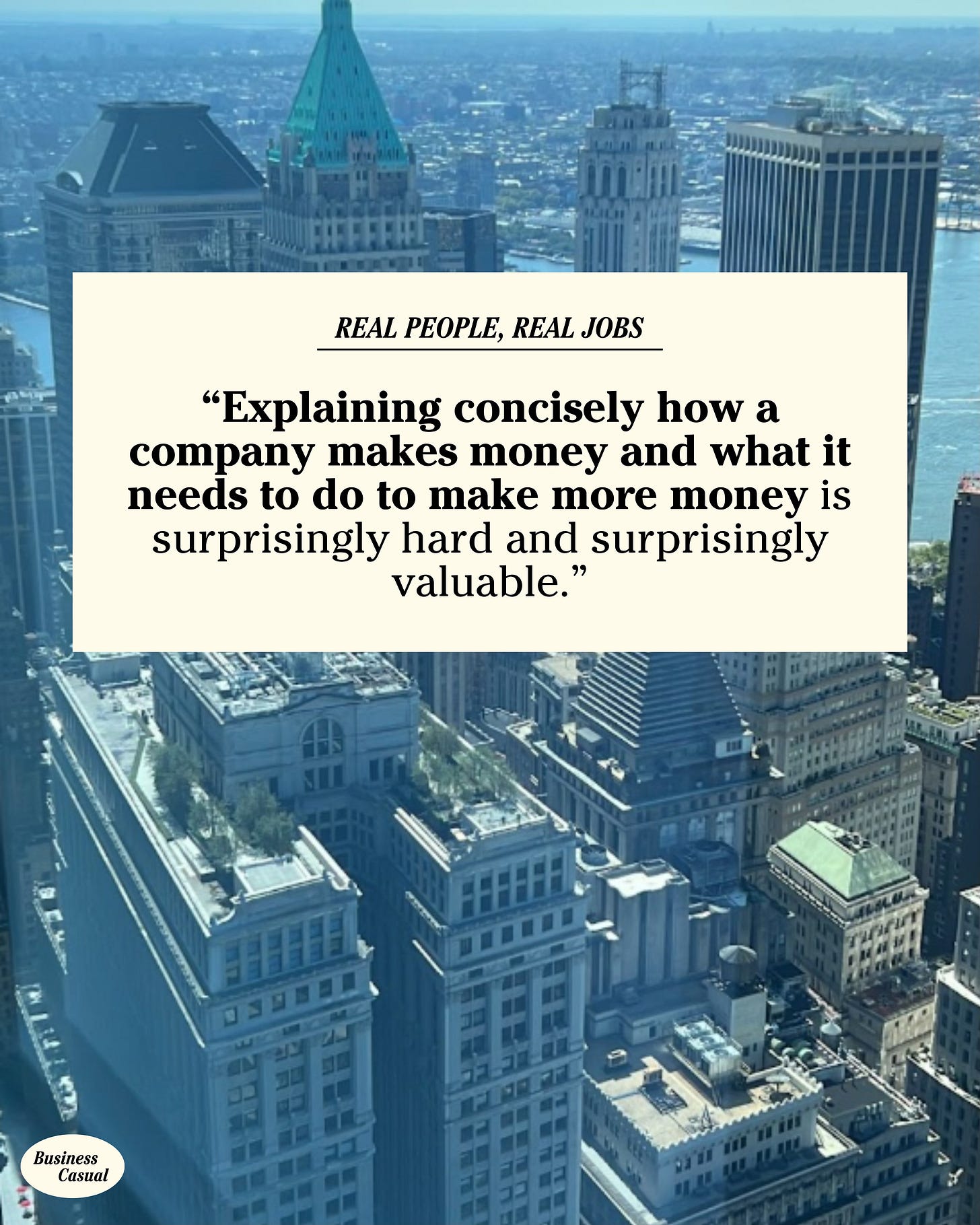Real People, Real Jobs — Joe Hovde
A Senior Data Scientist at the world’s #1 music streaming service
In Real People, Real Jobs, workers around the world share an unfiltered look at what their different jobs are really like and offer insider tips on how to get there. Past features include a Marketing Manager at YouTube, a Consultant at Bain, and a teacher at the second largest school district in the U.S.
When I started writing Business Casual three months ago, it was because I wanted badly to build something, and writing a Substack seemed like it had the lowest barrier to entry. I had to stop planning and just start making. I hardly knew then that one of the best parts of Substack would be all the cool, interesting people I’d get to interact with through the platform.
is one of those people.I first came across Joe’s newsletter
when I read his smart and fun analysis of Sweetgreen vs. Chopt. I loved how he followed his curiosity: he’d noticed something in his own behavior, and dug deeper into whether his individual actions represented a broader trend. He examined data from budgets, ratings, and reviews, and packaged his findings into a thought-provoking letter about venture-backed hospitality concepts, customer service, and the general malaise of corporate lunch. Joe’s piece inspired one of my very first letters, “A Global Lunch Break,” where I explored what workers around the world eat for lunch (the answer: a lot of protein).Residual Thoughts continues to be one of my favorite Substacks; Joe writes about brands and questions that I’m always interested in, and in a way that’s thorough and entertaining (recents favorites include “What should Allbirds have done differently?” and a piece about thinking you’re too late to start a business in a particular category, when you might just be early). When I found out that Joe is also a data scientist at Spotify, I wanted to know more. So here he is to tell you about his morning routine, how he balances his day job with his Substack, and what someone who wants his job can do right now to get there.
Joe Hovde is a senior data scientist at Spotify, where he helps build the platform’s podcast product. Previously, Joe held data science roles at CPG tech companies CircleUp and Quotient Technology. In addition to his full-time job, Joe writes whimsical data analyses about business and tech in his Substack Residual Thoughts. He lives in Brooklyn – if you’re in New York, reach out to him for coffee! Here’s the inside scoop on what it’s like to work at the world’s #1 music streaming service.
I think anyone who wants to get into data should build a little website and try to make $10 from it. You could do this with affiliate links or ads or some other way. Look at the analytics from your website and make decisions to optimize it — that will help put you in the mindset of the people who run the products you want to work for.
On a workday in his life: Monday, May 5, 2025
It took me a while to discover but I’m a morning person and have much more energy before noon. So I’ll wake up at about 7am and go straight to work. I used to have nice, relaxed mornings where I’d have coffee and read but I’ve realized I should just be creative when I have the energy, so I will start writing or working immediately and have coffee at the office.
From 9am to 11am or so I listen to music and do analysis to figure out how a recently rolled out feature is performing — how many people are using it, does it cause them to consume more podcast content, which types of users is it resonating with. At 11am I get up and get coffee in the office and then at 11:30am I have a weekly meeting with my team to talk about priorities for the coming week.
I schedule an extremely utilitarian Chopt salad for pickup at 11:45am (to beat the rush at noon!). This is expensive but I like not thinking about what to have for lunch and a salad is light enough that I don’t fall asleep in the afternoon (and it has provided me with lots of content: priceless!!) I usually eat lunch at my desk which is lame but kind of goes with the vibe of fast casual salads.
We have a lovely “wellness room” with plants and cushions and a great view and I often meditate for 10 minutes after lunch, which is a nice way to keep my mind from being cluttered throughout the day. I’ve been liking the app The Way as a guide.
I have a meeting with our People team about what our summer interns will do from 1-2pm; it is a large virtual meeting so I respond to some Slack messages while I listen to it.
From 2-3pm I prepare a slide deck with reporting updates for a meeting with some of the product leadership on the podcast team. I am not very good at making aesthetically pleasing slides, it’s something I’d like to get better at.
At 3pm I have a biweekly meeting with my coworker in the Audiobooks team; he is in the office and we talk some about work and just catch up about life.
At 3:30pm I start working on a longer-term analysis which has to do with how we segment creators for analysis on Spotify. This is a fun type of project but requires focus because it’s pretty open-ended. I make some progress on it but by 5pm I don’t have much energy left. I wind down for the day and then at 5:30pm leave the office.
I listen to a podcast on the 30 minute walk to an indoor soccer field on the lower east side where Spotify sponsors a weekly game (a nice bonus of working on podcasting is that this walk feels sort of productive). It’s a really nice way to relax and run around after work and get to know people from other teams at the company.
At 7pm I head home for the evening! I sometimes will need to work on something if there is a deadline or some issue, but usually am off for the night and try to put my phone and computer away by 9pm and sleep by 10:30pm or so.

On a misconception people often hold about his job:
People overestimate the importance of specific technologies for my role. It doesn’t matter very much whether you are writing Python or R or visualizing data in Tableau or Looker or whatever. Once you have a base level of technical ability, the main skill is building a coherent narrative of what is going on with the business, and how it can be improved.
Oh also people often think that I made their Spotify Wrapped which unfortunately is not correct.
On something about his role that you wouldn’t know from the job description:
It involves a lot of non-quantitative analysis, talking to people and digging through documents and Slack messages and trying to understand what is going on with a problem.
On what someone who wants his job can do right now to get there:
Try to understand businesses at a deep level. There are lots of resources for this; my favorites tend to be podcasts (this is one of my favorite business shows; if you’re interested in Spotify this is a good episode). You really want to be able to speak the same language as the executives at the company — figure out what media they consume and consume that.
This is a little more work, but I think anyone who wants to get into data should build a little website and try to make $10 from it. You could do this with affiliate links or ads or some other way. Look at the analytics from your website and make decisions to optimize it — that will help put you in the mindset of the people who run the products you want to work for.
On his favorite part of his job:
Figuring out why something is happening in our product that we didn’t expect.
On the most challenging part of his job:
Coordinating with people across different teams, who all have different contexts and different incentives. That’s been the hardest thing about working at a bigger company. It is a skill in itself that you have to build.
On AI:
I am quite freaked out by AI. I think the crazy pace of change is not something that society is built to handle. I do think it is a big opportunity for young people, because everyone is starting at square one with generative AI, and every single company is trying to figure out how to deal with it. So young people have an opportunity to be at the forefront of the most important tech shift in at least 30 years. It’ll impact the labor market a lot, but I think people are probably underestimating how much more productive it will make employees, which I believe will help counterbalance the job loss impact, at least for a while.
On a personal level, I use AI coding tools every day and they’re helpful. I also use it as a Google replacement or a summarizer. I think it’s probably made me 1.5x more productive.
On writing and growing Residual Thoughts, his Substack:
I mostly write and do analysis because it’s fun! And I think doing creative things is very good for your soul. But the growth of it has been really cool to see and lots of interesting things have happened because of it. It’s been a great way to meet people who share my interests and it has expanded my perspective of what I can do professionally. I think the obsession with growth can get a little unhealthy though so I try to step back when I feel the dopamine flowing too much, and just focus on the creation part.
I come up with ideas by looking for questions that interest me, and particularly things that represent a broader societal trend (for example, I think Allbirds’ rise and fall is a good representative of ZIRP-era tech culture). Coming up with ideas gets easier the more you do it; writing trains your brain to look for more of the stuff you write about.
On balancing his full-time job with his Substack:
I view Substack like any other hobby. I like it and it means something to me so I make time to do it. I’ve had to tighten up my working habits a little to be able to write consistently and that’s been really good — I deleted Twitter from my phone, I spend less time mindlessly reading news, wake up a little earlier, stuff like that.

One thing (tool, skill, secret, etc.) anyone who wants his job must know:
Explaining concisely how a company makes money and what it needs to do to make more money is surprisingly hard and surprisingly valuable.
One person or publication you must follow if you want his job:
I think Torsten Walbaum’s and Tessa Xie’s writing about strategy and data roles are both really helpful for understanding how to actually be better at your job.
His work-life balance on a scale of 1 to 10 (1 = works all the time, including weekends, and doesn’t have any personal free time; 10 = standard 9-5 job with manageable demands):
Idk, at least an 8? I feel like I have a really great work setup.
I hope you enjoyed this edition of Real People, Real Jobs! Follow Joe and , and share this post with your friends who use Spotify.









Paris has many advantages but the view from NYC office is better :)
Thanks for featuring me!!!
I do agree. When I was hiring SEOs, I was asking about their personal website, and when hiring engineers, I was checking their GitHub...